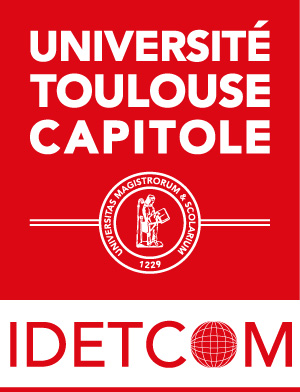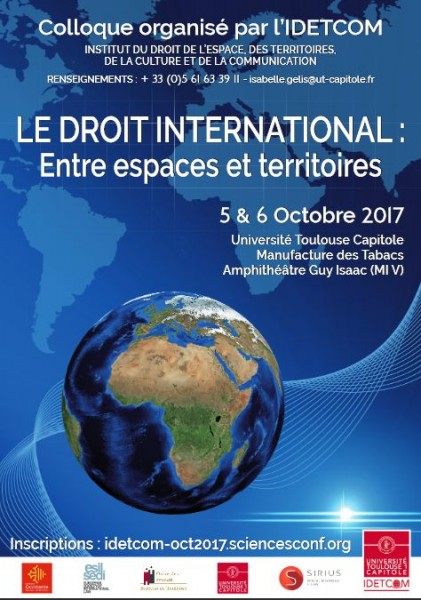research activities
‘International law: between spaces and territories.’ Symposium organised by IDETCOM
Research - Theme
‘International law: between spaces and territories.’ Symposium organised by IDETCOM
on the October 5, 2017
Amphithéâtre Guy Isaac (MI V)
21 allée de Brienne
21 allée de Brienne
Globalisation over the last three decades has upset geographic and sectoral borders. The clawback of sovereignty by nation states has once again demonstrated their own limitations. The concept of national territories has become too narrow for the application of the law. The challenges, such as environmental protection, are global; while, the advancement of science has opened up new spaces, in both the digital and off-world sense.
A deeply unsettling feeling is pervasive. The difficulty in drafting new rules adapted to current times is one aspect, but so is the need to comprehensively overhaul legal concepts, approaches and methodologies.
International law is not immune. The limitation of treaties is regularly shown despite them being the framework for international relations. They are in urgent need of profound changes as demonstrated by their inadequacies and the impotence of international organisations.
This symposium does not propose taking a general overview scattered with examples; instead, it will be used to analyse current difficulties, in the form of case studies within workshops on specific topics. In this way, a number of general lessons can be extracted.
It should not be forgotten that States, through their political, socio-economic or military activities, are the founders and still the indispensable subjects of international law. They have been and still are the instigators of the organisation of geographical and physical spaces. Even though their sovereignty may clash nowadays with the extra-territorial application of national laws, they must also confront today’s challenges of ever-increasing magnitude. These challenges relate to the use of new spaces opened by the digital revolution, which is itself linked to the development of off-world activities. Territory, the traditional domain for the expression and demonstration of sovereignty, is at the core of unprecedented migratory challenges (war, economy, climate).
This two-day symposium will encourage attendees to reflect on a new approach to national ‘territory/territories’ in connection with the space(s) unearthed by technological progress.
A deeply unsettling feeling is pervasive. The difficulty in drafting new rules adapted to current times is one aspect, but so is the need to comprehensively overhaul legal concepts, approaches and methodologies.
International law is not immune. The limitation of treaties is regularly shown despite them being the framework for international relations. They are in urgent need of profound changes as demonstrated by their inadequacies and the impotence of international organisations.
This symposium does not propose taking a general overview scattered with examples; instead, it will be used to analyse current difficulties, in the form of case studies within workshops on specific topics. In this way, a number of general lessons can be extracted.
It should not be forgotten that States, through their political, socio-economic or military activities, are the founders and still the indispensable subjects of international law. They have been and still are the instigators of the organisation of geographical and physical spaces. Even though their sovereignty may clash nowadays with the extra-territorial application of national laws, they must also confront today’s challenges of ever-increasing magnitude. These challenges relate to the use of new spaces opened by the digital revolution, which is itself linked to the development of off-world activities. Territory, the traditional domain for the expression and demonstration of sovereignty, is at the core of unprecedented migratory challenges (war, economy, climate).
This two-day symposium will encourage attendees to reflect on a new approach to national ‘territory/territories’ in connection with the space(s) unearthed by technological progress.


